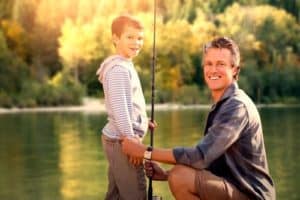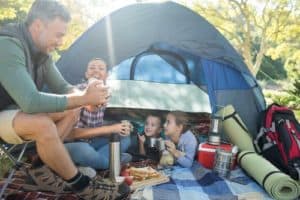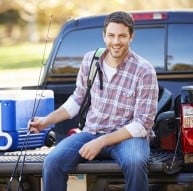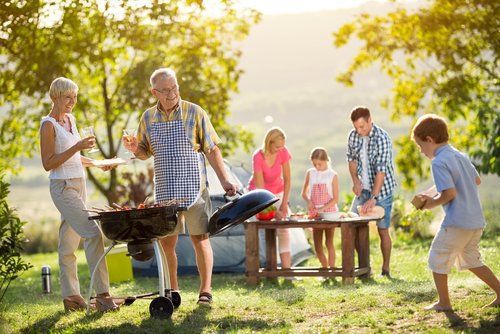
Introduction: They don’t come often, but we have another guest post today, and this is one I think Jon will like. As he’s raising the nephews he’s always looking at age appropriate activities to make sure they have the same love of the outdoors that we grew up with, and it can be challenging at their very young ages to figure out how to make it work for everyone.
With this topic and those specific challenges in mind, let’s yield the floor and introduce guest poster Paul Watson from Outdoor Choose and his excellent take from experience on the all important best tips for camping with kids.
Article Title: “The Best Tips for Camping with Your Kids”
For most people, it would be great to break free from the hustle and bustle of the city every now and then. One of the best ways to relax from the endless cubicle mazes or the concrete jungle is to go out in the woods and enjoy the clean, crisp air, and the beautiful scenery of trees, or stunning lakes and rivers. While camping out in the woods might seem like an activity for grown-ups, don’t underestimate the wonder and curiosity that children can have when surrounded by nature outside.
Being in an environment that’s new, paired with the restless, inquisitive nature of kids means you need to be mindful of certain things, and a few more preparations should be done if you wish to take your kids along with you so you can have a safe and enjoyable outdoor experience for everyone. This is doubly true if it is the first outdoor camping experience for the kids.
With that said, here are some tips to keep in mind for camping with your kids to make this the best, most worthwhile experience for them.
Table of Contents
Tip #1: Take notes
One of the best ways to prepare for the trip is to take notes. On a piece of paper, list down all the things that you need to bring for you and your kids, giving yourself plenty of time to re-visit the list and keep mulling over all the different things you may ending up needing. If your kids are a bit older, then you can teach them to do the same and supervise them in packing their things and preparing for the trip. (Shane’s note: Always a good idea for pre-planning, remember the Scout Motto: Be Prepared)
Tip #2: Make a practice run
This is especially easily done if you have a backyard. This can be done even just for one night, ideally a week before camping. An especially good idea for first-timers or for campers with young children, prepare as you would during the actual camp regarding camping essentials, except clothes, even if you will use some modern conveniences back in the house.
In the practice camp, you can look for ways to improvise materials, especially for cooking, as well as know the right amount of sleeping materials and fabrics to bring to keep your kids comfortable. Take this time to familiarize yourself with how to assemble your tent, as well, especially if you recently brought a new family tent.

Tip #3: Orient your kids beforehand
If you have already camped at that place previously, be enthusiastic about sharing with your kids about the things they are to experience there. Allow the kids to be comfortable and to adjust to a new sleeping environment, and if possible, show pictures of the camping area.
If the children are a little older look at maps, use technology to look at Google Maps to see the area you’ll be staying at, and take a look at pictures of places nearby you might want to visit.
Once at the actual campsite, set up camp quickly and then walk around with the kids to orient them, and yourselves, about where camp is. Point back to camp from nearby areas and help them get a sense of where your “new home” is, and get a sense of where everything interesting close by is, what trails are around, and how to get to each place from camp and back to camp again.
Tip #4: Don’t bring too much
This is the most common mistake that a lot of even experienced outdoor people fall for when camping with kids for the first time. Parents usually assume that they have to bring a lot of things to make the experience more comfortable for the kids. The practice camp gives you the opportunity to sort out what’s truly needed for the actual trip and what could just be left at home.
Clothes comprise a huge part of the baggage. Teach your kids that you could always re-wear certain apparel. Keep it to bare essentials, from hygiene products, clothing, and cooking materials with some non-electronic materials to keep them entertained. This is a great time to fall in love with reading a good old fashioned book or enjoying the long moments away from electronics.
Tip #5: Bring non-electronic entertainment along
While Mother Nature has a lot to offer, it just can’t be avoided that many modern kids, as restless as they tend to be, get bored rather easily. However, as more and more studies come out showing the negative effects of too much screen time, camping out is the perfect time to keep the smart phones and the tablets at home. To cater to idle time, or to make evenings more worthwhile, bring along some travel-sized board games, playing cards, and storybooks that could keep the kids occupied when it’s dark out and time to stay around the tent or camp for the night.
It’s not a good idea to bring electronic, portable gaming consoles along with you as it defeats the whole purpose of the activity. You wouldn’t want your kids to stay in the tent the whole day, would you? Unless it’s raining, at which point some family time together is a better way to spend time.
Tip #6: Keep the mood happy
While a new environment is something to look forward to, even the best days in the woods or out in the wild can sometimes bring back frustrations or discomforts you forgot about (like the sheer number of bugs that might be out and about). While this can be frustrating at times, it’s important to remember why you’re out there and not let it get to you.
Don’t complain or rant in front of the kids – even older kids can easily pick up your mood and be affected by it. Keep a happy mood, laugh off the struggles or focus on the good, and together you will have a much better overall trip.

Tip #7: Keep a constant eye on the little ones
While you don’t want to scare off the little ones from the joys of camping, there are many ways that the camping site and various woods (or mountains or deserts or whatever the local ecosystem for you is) can be prone to a lot of small dangers and you definitely need to be aware of them. This can be from things like small shards of glass or trash that other campers may have left, to wild animals that might be found in the area, to the common issues that can happen from splinters to allergies and more.
Anyone with really little kids understands just how quickly they can slip away and get into trouble making at an impressive full sprint. Make sure to be on top of your game with keeping a constant eye on all the little ones. You’ll need your energy!
Tip #8: Make the most of your stay
Do some research about the campsite to make sure that you can make the best out of it. Check out its wildlife and take time to appreciate flora and fauna nearby. Take this moment to orient your kids about things they usually don’t see at home or in school. Most of the time, field guides are available. Get one if you can for you to roam around the place safely as well, and be willing to check out something new or unusual and give everyone a chance to mention what they want to see and everyone go there together as a group.
After all, it’s the family time that makes the memories that everyone will cherish.
Tying It All Together: Some Final Thoughts
When you’re done camping, make sure to clean as you go and try to leave the campsite even more beautiful and pristine than how you found it. Teach your kids the importance of preserving and taking good care of the environment. Pick up pieces of glass, plastic, and other waste you may have thrown in your vicinity. They will notice these habits and help them adopt an appropriate respect for the natural world around them, as well.
To keep trash as contained as possible, make sure to keep a sack, especially near your cooking area. If you are in a protected area, be wary of other policies on keeping clean that they might have, as well, and heed any warnings about nearby wildlife so you know the proper way to store everything.
In a nutshell, it is not at all going to be a bad experience for kids if they would have adults who are there to guide them. It’s all about striking the balance in teaching your kids to be independent and responsible and being a protective parent at the same time.
 Author Bio
Author Bio
Paul Watson is a blogger who likes to share information about camping and the outdoors. He expresses his passion for camping and other outdoors not only by embarking on several outdoor adventures but also writing about them.
Follow me on Twitter.

